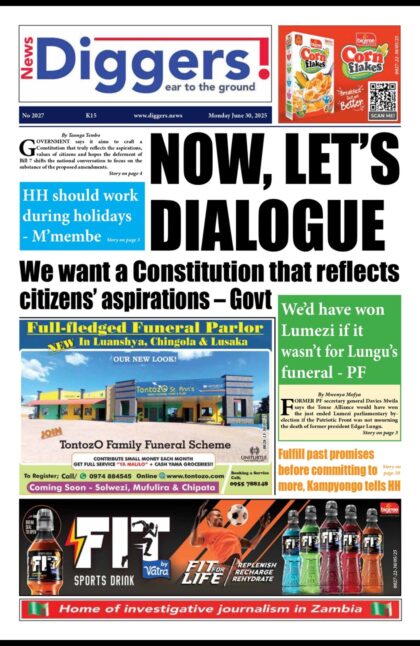UNIVERSITY of Zambia School of Health Science Dean Dr Sody Munsaka says it will take between eight to 10 years for Zambia to vaccinate the entire eligible population against COVID-19 if it remains voluntary for all sectors.
In an interview, Wednesday, Dr Munsaka said voluntary vaccination had affected the uptake.
He proposed mandatory vaccination for sectors like health.
“In Africa generally, the vaccination coverage is very low compared to the global figures. The countries that have come up with certain measures, remember that here in Zambia, vaccination is voluntary. So in a way, I think that has an effect on uptake. Of course I’m not proposing that we mandate vaccines but I feel if certain sectors have some levels of mandate, for instance, the health sector, is there a reason why a nurse, doctor or laboratory person should not be vaccinated? The people in the front line need to be vaccinated. The vaccines should be mandated in certain occupation groups and I will not mention the occupation groups. That is the only way we are going to get these numbers,” Dr Munsaka said.
“The issue of singing ‘voluntary vaccination’ and just singing and putting adverts and all that, I was looking at the figures, it will take us between eight to 10 years to actually vaccinate the 10 million people that should be eligible. By the way, there is new data coming up in terms of safety in these children. Today I was looking at an FDA report where Pfizer and Moderna have actually recommended starting from five years, meaning that we are now increasing very soon. Once the safety data for the vaccines we are using in children, we are going to start maybe from 12 years. Meaning we will increase the number of people to maybe up to 15 million.”
Dr Munsaka said the number of people Zambia had vaccinated in the last year, India had vaccinated in four hours.
“The vaccines we are using right now are from India. Remember there was that one month when there were no vaccines, it was because India wanted to actually vaccinate their population. I was looking at the numbers we have vaccinated so far. It is what India vaccinates in four hours. The number of people we have vaccinated in Zambia, I don’t know if it is in the last one year, is what India vaccinates in four hours. So on a monthly basis, there has to be some activity where even at the highest level there is involvement. So that we can get as many people as possible vaccinated before we go into December. In fact, it takes about one month to build immunity and so I’m telling people that by December 1, you should be vaccinated,” he said.
“When you look at the COVID situation, I will talk about Africa in general. We have had fewer cases as compared to Europe, America, and even Asia. Of course, the scientific community is not actually sure why that actually happened because it was expected that we will have a lot of deaths here in Africa because of our poor medical infrastructure, supplies and things like that. When you look at the Americans in the North and other parts of America, they are now approaching 60, 70 percent of coverage. Europe is way above 50 percent, Asian countries are 40, 50 percent. In Africa on average we are at five percent coverage and that’s the level of coverage we have even here in Zambia. There are only a few countries that are slightly above five percent like South Africa. But there are countries like Zimbabwe where they are doing 10 times better than us.”
Dr Munsaka, however, noted that vaccination rates had somehow increased ever since the relaunch of the programme few weeks ago.
“You saw about two weeks ago there was a relaunch of the vaccination and even the Head of State coming out that he was vaccinated. There has been from that time about a 50 percent jump in terms of vaccinations. Immediately after the relaunch, I was looking at the daily numbers, they actually jumped by 50 percent. In fact the first two days they even went up by almost 100 percent and then they started dropping. Right now they are actually higher than it was before that relaunch. It actually shows that there are particular steps especially from leadership that can be taken to actually enhance this uptake and I hope that can be sustained,” he said.
Meanwhile, Dr Munsaka said there was need to have many people vaccinated before the commencement of the fourth wave.
“When COVID started, you saw that the government through the Ministry of Health put a multisectoral team to combat this under the leadership of Zambia National Public Health Institute. We have seen even in terms of the recovery rate, Zambia has one of the highest recovery rates from COVID which is in the range of 98 percent. So when you look at the deaths that we have, I think it’s around two percent. We have really one of the lowest death rates from COVID, and that is attributable to a number of factors but one of them was the quick response and the partial lockdowns,” said Dr Munsaka.
“My expectation was that during this window between the third and fourth wave, we need to have as many people as possible vaccinated. From the population of about 18 million, the conservative estimate of eligible people is 10 million. But if you look at the latest figures we have, we have vaccinated less than one million. So we are really very far away in terms of getting our target and we need very drastic measures to ensure that between now and January to enhance efforts in vaccination.”


















